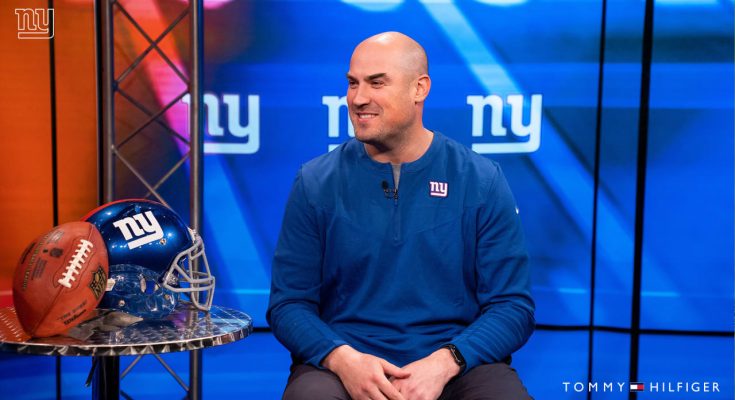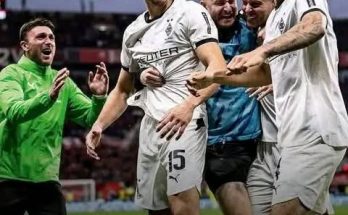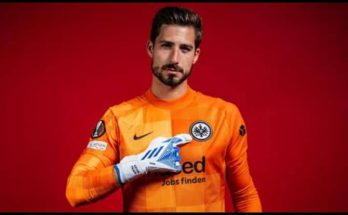New York Giants offensive coordinator Mike Kafka has made it clear that Jaxson Dart, the young quarterback sensation drafted to potentially lead the franchise into a new era, is “right on schedule” in his development. Those words may seem simple on the surface, but within the highly scrutinized world of NFL quarterback grooming, they carry weight, expectation, and a touch of reassurance for fans and executives alike. Dart’s presence in the quarterback room has been a consistent storyline since the Giants picked him up, and with the franchise in the middle of what seems to be a critical transition, all eyes are watching closely.
Jaxson Dart was not a consensus blue-chip prospect coming into the draft. He carried promise, flashes of brilliance, and a resilient work ethic that showed through both at Ole Miss and in his pre-draft interviews. What made him stand out to the Giants’ front office and coaching staff was his mix of toughness, improvisation, and leadership qualities. Many doubted whether he was NFL-ready, but the Giants took a calculated risk. Now, with months of practice reps, film study, and situational drills behind him, it seems the staff is growing more and more confident in their investment.
Mike Kafka, known for his detailed approach to quarterback development, has a background that lends credibility to any quarterback evaluation. He helped build Patrick Mahomes’ arsenal in Kansas City, and in New York, he’s been entrusted with molding the offensive identity around whatever quarterback the team deems the future. So, when Kafka says Dart is “right on schedule,” it isn’t a throwaway line — it’s a signal that the Giants believe they are on track with a bigger vision, one that involves Dart taking the reins sooner rather than later.
What’s become increasingly clear throughout training camp is that Jaxson Dart doesn’t just have raw talent — he has command. He processes reads better than most rookies, and though he still has to speed up his internal clock under pressure, his growth from rookie minicamp to the early days of preseason has been palpable. Teammates have commented on his poise in the huddle and his ability to bounce back from mistakes, qualities essential for long-term success in the league.
Dart’s arm strength has never been in question. He can sling it across the field with velocity and touch, and he’s shown an advanced understanding of throwing receivers open, particularly on intermediate routes. Kafka’s system, which demands timing, anticipation, and quick decision-making, fits Dart’s playstyle. But what sets Dart apart isn’t just what he does with his arm — it’s his ability to extend plays and move the pocket. He’s mobile enough to run for a first down, but he prefers to use his legs to buy time, scanning downfield and looking to strike.
The quarterback room in New York remains competitive. While Daniel Jones is still on the roster, there’s a sense of inevitability that the organization will hand over the offense to a younger talent. Jones has had his moments, but he hasn’t cemented himself as a long-term answer. Injuries and inconsistencies have plagued his tenure, and the team’s decision to draft Dart signals their openness to a future beyond Jones. For now, Kafka and the staff are walking a fine line — developing Dart while still publicly supporting Jones. But if Dart continues his current trajectory, that balance may soon tip in favor of the rookie.
Kafka’s confidence in Dart extends beyond simple platitudes. He’s praised Dart’s film study habits, his receptiveness to coaching, and his leadership qualities in meetings and on the practice field. The staff has noted that Dart asks the right questions, seeks out feedback, and doesn’t shy away from criticism — all signs of a player invested in the process. That investment is already paying dividends. During red zone drills, Dart has shown surprising precision, especially on back-shoulder fades and quick slants. His ability to operate in tight windows under pressure reflects an internal competitiveness that can’t be taught.
From a schematic standpoint, Kafka has begun to tailor portions of the offense to maximize Dart’s strengths. Motion-heavy formations, RPOs (run-pass options), and bootlegs have appeared more frequently in practice sessions when Dart is under center. These wrinkles not only suit Dart’s mobility but also simplify reads, giving him high-percentage throws and confidence-building progressions. The idea is not to overwhelm him with the full playbook immediately, but to let him master manageable sections while slowly integrating more complexity.
The Giants have also been careful in managing Dart’s reps. He hasn’t been thrown to the wolves, and the staff is monitoring his workload to avoid burnout. Still, there have been moments where he’s been given control of two-minute drills or been asked to adjust protections at the line — responsibilities typically reserved for more seasoned quarterbacks. Kafka’s approach is clear: challenge Dart, but within a framework where growth is supported, not stifled.
Off the field, Dart’s influence is also growing. Veterans have spoken highly of his demeanor and work ethic. He arrives early, leaves late, and has started to build chemistry with receivers like Wan’Dale Robinson, Jalin Hyatt, and even some of the tight ends in the rotation. Trust and timing are crucial in the NFL, and while these relationships are still forming, the early signs are encouraging. Dart’s humility and eagerness to learn have made it easier for the locker room to embrace him, and that’s not always a given with young quarterbacks.
Kafka’s comment about Dart being “right on schedule” also reflects internal benchmarks the team has established. They’re not just evaluating him against an abstract standard — they’ve likely mapped out phases of development, from grasping terminology to operating the offense in live-game scenarios. Every milestone matters, and based on Kafka’s tone, Dart is checking those boxes at the expected rate, if not slightly ahead.
Preseason games will be a critical test. While training camp practices provide glimpses into a player’s growth, nothing compares to live action. Blitzes come faster, defensive backs disguise coverages more effectively, and the pressure ramps up. How Dart performs in these games will provide more clarity, not just to fans, but to the coaching staff in evaluating how close he is to being truly ready. Kafka will be watching closely, not just for stats, but for decision-making, composure, and the ability to lead.
One underrated element of Dart’s development has been his connection with Kafka himself. The two seem to have developed a strong rapport, with open lines of communication and mutual respect. That relationship could prove essential as Dart progresses. Having an OC who believes in him, who’s invested in his growth, and who understands how to build an offense around a quarterback’s strengths is not something every rookie quarterback gets. In that regard, Dart may be in one of the best situations in the league.
Fans, understandably, are eager. They want the next Eli Manning, the next star to lift the Giants back to championship contention. Dart may or may not be that guy, but the early signs are promising. He has the talent, the attitude, and the support system. Most importantly, he has time. The Giants aren’t rushing him, but they’re also not hiding him. Kafka’s words — “right on schedule” — are deliberate, chosen to temper expectations while signaling progress.
It’s easy to overreact to training camp buzz. Every year, quarterbacks flash in August only to fade when the real games begin. But Dart feels different. There’s a quiet confidence in the building, a sense that something is slowly taking shape. Kafka’s track record suggests he knows what a high-level quarterback looks like, and if he believes Dart is trending in that direction, that’s a significant endorsement.
In a league defined by quarterback play, the Giants have made their bet. They didn’t draft Dart to be a backup. They saw in him the raw materials of a franchise quarterback and handed him over to one of the league’s most respected offensive minds. The process will take time, but with each practice, each rep, and each lesson absorbed, Dart inches closer to the role many believe he was born to play.
If he continues on this path, there may come a point in the not-so-distant future when “right on schedule” gives way to “ahead of the curve.” For now, that steady, deliberate pace is enough. It’s enough for Kafka, for the Giants, and maybe even for a fanbase starved for a quarterback to believe in. Jaxson Dart doesn’t need to be a superstar overnight. He just needs to keep showing up, keep improving, and keep earning the trust of those around him. And by all accounts, he’s doing exactly that.



